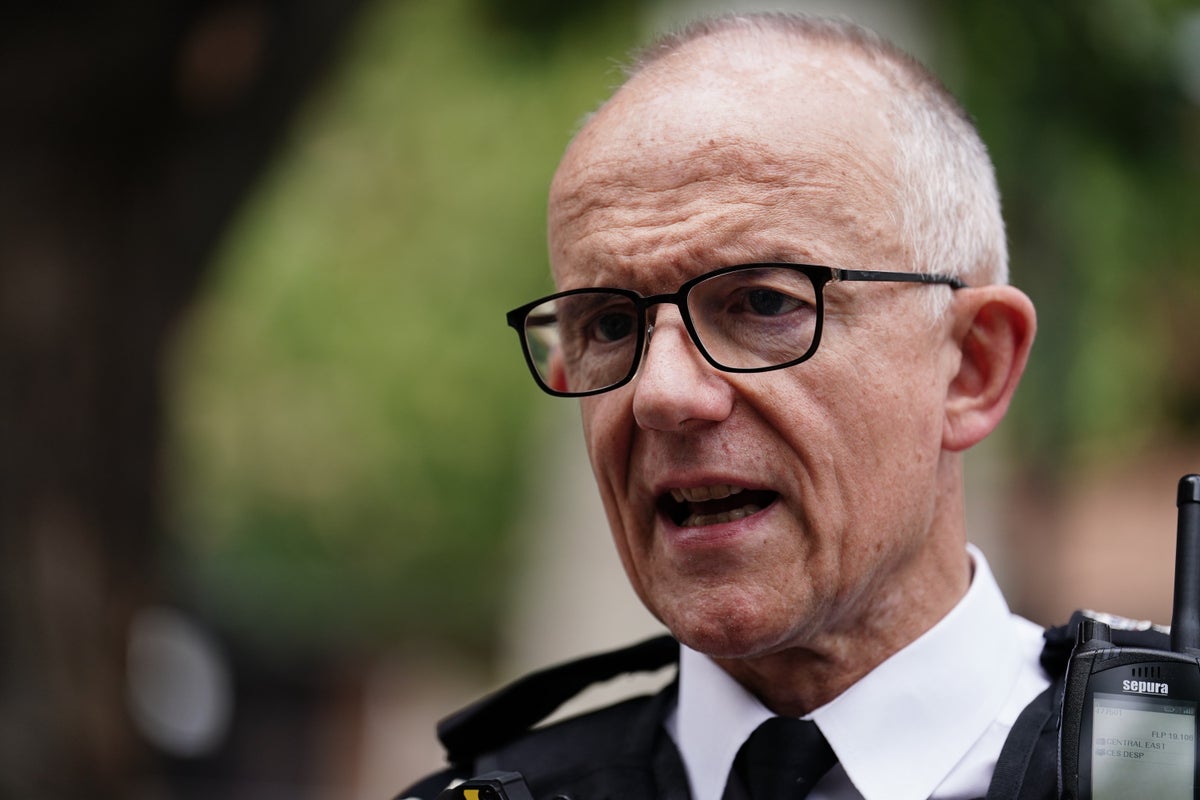
A pro-Palestinian demonstration is set to go ahead on Armistice Day after the head of the Metropolitan Police said there is “no absolute power” to ban protest.
Sir Mark Rowley resisted pressure heaped on the force by politicians including Prime Minister Rishi Sunak to try to block the gathering in London on Saturday.
In a statement on Tuesday, Sir Mark said intelligence surrounding the potential for serious disorder this weekend does not meet the threshold to apply to prohibit the march.
... complete willingness to stay away from the Cenotaph and Whitehall and have no intention of disrupting the nation's remembrance events— Sir Mark Rowley
“The laws created by Parliament are clear. There is no absolute power to ban protest, therefore there will be a protest this weekend,” Sir Mark said.
“The law provides no mechanism to ban a static gathering of people. It contains legislation which allows us to impose conditions to reduce disruption and the risk of violence, and in the most extreme cases when no other tactics can work, for marches or moving protests to be banned.”
He said use of the power to block moving protests is “incredibly rare” and must be reserved for cases where there is intelligence to suggest a “real threat” of serious disorder.
But he said organisers of Saturday’s march had shown “complete willingness to stay away from the Cenotaph and Whitehall and have no intention of disrupting the nation’s remembrance events”.
“Should this change, we’ve been clear we will use powers and conditions available to us to protect locations and events of national importance at all costs,” Sir Mark said.
The Met had urged the march organisers to “urgently reconsider” the event on Saturday because of a growing risk of violence, but the pro-Palestinian coalition behind it have refused to call it off.
The Prime Minister himself does not think it’s right for these sorts of protests to be scheduled on Armistice Day. He believes that is provocative and disrespectful— No 10
The force could request the power to ban the event under Section 13 of the Public Order Act 1986, but that would only apply if there was the threat of serious public disorder that could not be controlled by other measures.
The Prime Minister’s official spokesman said operational decisions on whether to ban the planned march were for the Metropolitan Police, but he added that the Government would “carefully consider” any application to prevent it.
“The Prime Minister himself does not think it’s right for these sorts of protests to be scheduled on Armistice Day,” the spokesman said.
“He believes that is provocative and disrespectful.”
The coalition of groups, which includes the Palestine Solidarity Campaign, Stop the War and the Muslim Association of Britain, insisted they would press ahead with the demonstration calling for an immediate ceasefire between Israel and Hamas in the Gaza Strip.
There are concerns that breakaway groups from the main march could look for trouble, while counter-demonstrations may add to policing difficulties.
English Defence League founder Tommy Robinson said “British men are mobilising for Saturday to be in London” to “show our Government and show our police and show Hamas and everyone sitting around the world saying ‘Britain has fallen’ that there is a resistance”.
Veterans’ affairs minister Johnny Mercer urged former military personnel not to join protests and stressed that the route of the march was not due to go near the Cenotaph in Whitehall.
Mr Mercer, in a letter to Sir Mark, said he had spent the weekend “dissuading various veterans groups from organising marches or protests this Saturday”.
But he urged police to protect veterans marking the Armistice or Remembrance Sunday.
“I have particular concern towards our elderly veterans for whom travelling to London once a year is an important part of their remembrance, and have expressed genuine fears to me around their ability to travel to London, particularly through our rail stations, unmolested,” he said.
His comments came after 78-year-old poppy seller Jim Henderson was allegedly punched at Waverley Station in Edinburgh during a pro-Palestinian rally, an incident described as “repulsive” by Downing Street.
The planned route for the London march goes from Hyde Park – about a mile from the Cenotaph – to the US embassy in Vauxhall, south of the Thames.
Home Secretary Suella Braverman said previously “hate marchers need to understand that decent British people have had enough of these displays of thuggish intimidation and extremism”.
Justice Secretary Alex Chalk distanced himself from her comments, making clear that he would not use the language of “hate marchers” but insisting that did not signal “confusion” within Government.
“There is no doubt there are elements on these marches that I’m afraid are espousing hate… but equally, there will be those people who are there expressing their anguish at some of the untold suffering,” he told BBC Radio 4’s Today programme.
The organisers said in an earlier statement: “We recognise the political pressure being placed on the police by the Government and right-wing political groups.
“However, we emphasise that they had and have a responsibility to withstand that pressure and act to uphold democratic freedoms.”
The Festival of Remembrance at the Royal Albert Hall, which will be attended by the King and Queen and other members of the royal family, will take place on Saturday, with a two-minute silence at 11am.
Remembrance Sunday events will take place at the Cenotaph in Westminster the following day.
Meanwhile, the Government believes there are three British hostages still being held by Hamas in the Gaza Strip.
More than 100 UK nationals who were in the territory when the war broke out have been able to flee the territory through the Rafah crossing with Egypt.







